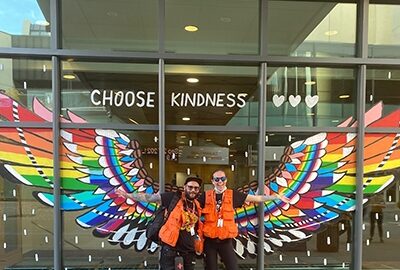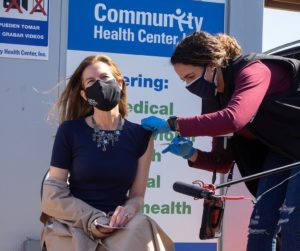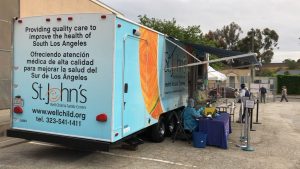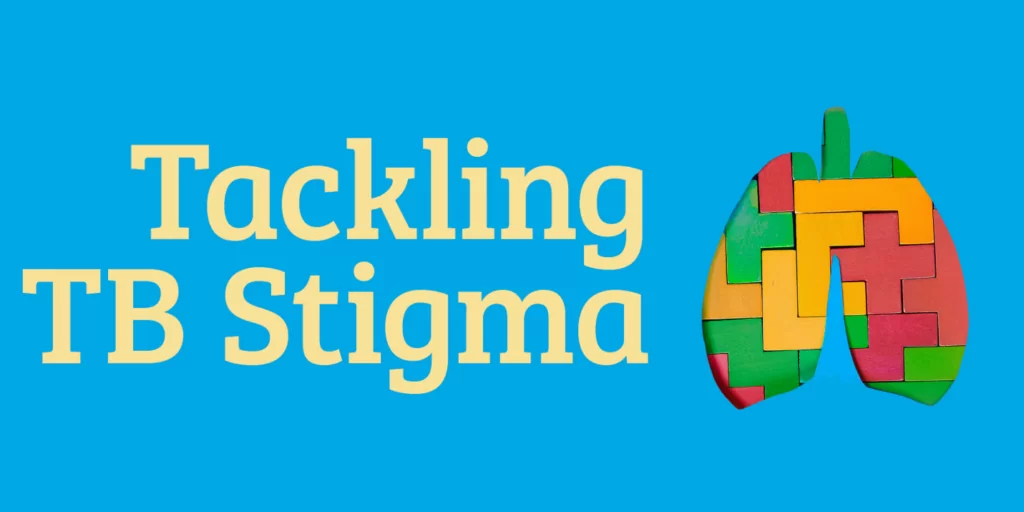IFCHC e-Newsletter 2022.01
News and stories from IFCHC member Community Health Centres and CHC associations around the world
Progress report on the Victorian COVID-19 community health service worker wellbeing study
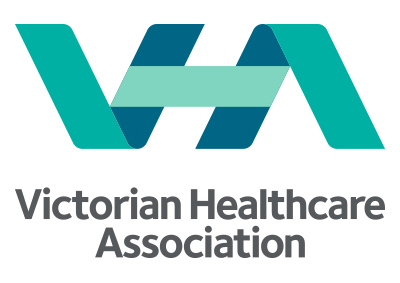 An update on the ‘Psychosocial impact of the COVID-19 pandemic on community health service staff’ study – a joint initiative by the Victorian Healthcare Association and Deakin University.
An update on the ‘Psychosocial impact of the COVID-19 pandemic on community health service staff’ study – a joint initiative by the Victorian Healthcare Association and Deakin University.
The COVID‐19 pandemic is having, and will have, a considerable impact on the health sector in Australia. Although evidence about the psychosocial effects of the pandemic on hospital clinical staff is emerging, little is known about the impact on community health service staff who undertake various roles including education, advocacy and clinical services; and work with a range of communities including those which experience disadvantage and are culturally and linguistically diverse, many of which have been disproportionally affected by COVID‐19.
The aim of this project was to assess the immediate and longer‐term psychosocial impacts of the COVID‐19 pandemic on community health service staff in Victoria, Australia. Staff (both clinical and non-clinical) employed at eight Victorian community health services (Ballarat Community Health, cohealth, Connect Health, Gateway Health, IPC Health, Merri Health, Primary Care Connect and Star Health) were invited to participate in the study and complete two surveys: the first one in March/April 2021 and the second in September/October 2021.
Data from the second survey is currently being analysed but the preliminary findings from the first survey indicate that the COVID‐19 pandemic has had a considerable impact on the psychological wellbeing and work and personal lives of community health service staff in Victoria. Approximately one in ten of the community health service staff surveyed (n=681) reported moderate to extremely severe symptoms of depression, anxiety and stress. Fewer years of work experience in the sector were significantly associated with higher levels of psychological distress.
Respondents were mostly concerned about their family’s health and infecting family members, and managing their work and family responsibilities. Concerns about accessing and using personal protective equipment, redeployment, and changes to the way they delivered service to their clients/stakeholders during the pandemic were also reported.
Many respondents indicated that greater organisational support would have been beneficial for their personal wellbeing and would assist them to continue to provide high-quality care to their clients. Despite their concerns, few staff had considered resigning and positive aspects of the pandemic were also described including that it had been a learning experience, and that they experienced a greater appreciation of life and work and a sense of togetherness and cooperation among staff.
The findings suggest that community health service staff, particularly those with fewer years of experience in the community health services sector, would benefit from continued and targeted psycho‐educational, social and occupational initiatives and support which address their psychosocial concerns.
Merri Health’s High-Risk Accommodation Response keeps vulnerable Melbourne residents COVID-safe
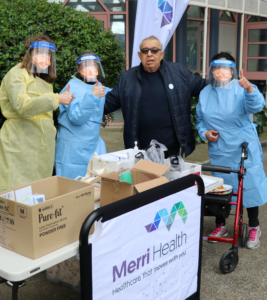 When COVID-19 broke out in Melbourne’s North, the Victorian Government turned to Merri Health and other critical community health organisations to help prevent the spread in local communities.
When COVID-19 broke out in Melbourne’s North, the Victorian Government turned to Merri Health and other critical community health organisations to help prevent the spread in local communities.
Melbourne’s North Western region is highly culturally and socio-economically diverse, with 36% of the population born overseas. Residents face several health issues, and over 50% of adults in the Moreland area have one or more chronic diseases.
Merri Health, and its partners used their unique local knowledge, local relationships, and local connections to successfully deliver COVID-19 safety education, engagement, run testing clinics, facilitate vaccinations and keep vulnerable, harder-to-reach communities connected.
Testing
Merri Health partnered with Moreland City Council to establish four testing sites in June 2020, following a spike in positive COVID-19 cases in the area. Over 22,000 tests were conducted and auditors praised Merri Health and its partners for ‘gold standard’ infection control practices and testing at the clinics.
Vaccination in high-risk properties
Public housing and accommodation with shared facilities poses high risks for COVID infection. Merri Health supported residents, public housing landlords and managers at 161 properties, including: rooming houses, low-rise public housing, high rise public housing, community housing supported residential services (SRS) and homeless hotels to help prevent the spread of COVID-19 and increase vaccination knowledge and take-up.
Support included Q&A sessions, outreach door knocking and vaccine information packs to reduce hesitancy. Merri Health also partnered with vaccinators to bring vaccines to the doorsteps of these communities.
Supported properties include housing estates where 90% of residents are aged 60 or over. Some of these residents have complex pre-existing physical and mental health conditions. As of October 2021, 87% of residents in these estates had received at least 1 vaccine dose and 77% were fully vaccinated.
“We are so appreciative of all the support Merri Health has given us which included door-knocking and other opportunities for face-to-face conversations. If the in-reach clinics were not set up on-site, not sure we would have had our vaccinations and we are so glad we have. Thank you so much for helping keep us safe.”- High-rise resident.
Isolation support
Merri Health’s COVID response did not stop at vaccination and testing. When one of the Merri supported properties received the text “you have been in a tier 1 exposure site”, the team sprang into action once again.
Merri Health organised in-home testing for residents and partnered with other organisations to provide essential supplies, including fresh food and personal care items, to help them stay safely at home.
Masks and cleaning products were given out in COVID safety packs, along with fun activity bundles for both adults and children, to support their mental health. Support items included: Food relief; Care packs; Medication support; Child and adult activity packs; Taxi vouchers; PPE; Phone credits; and Pet food relief.
“Thank you to Merri Health for taking all my calls as I’m extremely stressed and worried about my family. Happy I have someone to talk to. Thank you for everything you have supported especially getting my medication” – Resident in Tier 1 property.
New Community Health Centre podcasts from North America
In 2021, both the U.S. National Association of Community Health Centers (NACHC) and Canadian Association of Community Health Centres (CACHC) launched national podcasts. See episodes of CACHC’s “Community Matters” and NACHC’s “Health Centers on the Frontlines” below. Remember to hit the “Like” button and subscribe to the podcasts to get notified of new episodes.
Bromley by Bow releases 2021 impact report
Read this inspiring report of achievements from IFCHC’s member Community Health Centre in London, UK.
30 stories of CHC belonging and impact in Toronto
Our member CHC in Toronto, Canada — Access Alliance Multicultural Health and Community Services — has developed this 30 Stories series, to share the history and impact of their organization.
See and connect with our members
Visit our members page to see and connect with our growing, global network of members. Are you a CHC or CHC association and want to learn more? Click here.
Community Health Centers can too!
In fact, they do! Our member, CHC Inc, based in Connecticut, USA, runs a national podcast called CHC Radio. You should check it out!
Integrated Chronic Care at Australia's cohealth Empowers Clients to Find Their Voice
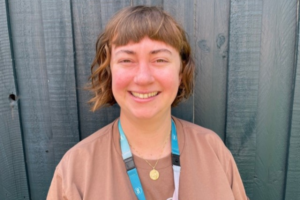 Integrated Chronic Care (ICC) assists people with complex, chronic and often dual diagnoses to navigate the health system and care for their mental, social and physical wellbeing.
Integrated Chronic Care (ICC) assists people with complex, chronic and often dual diagnoses to navigate the health system and care for their mental, social and physical wellbeing.
Lucy Bassett works as cohealth’s ICC Care Coordinator and she says one of the most rewarding things about her job is empowering people to find their voice.
“Seeing [the client] now and seeing the pride that he feels and the trust he’s put in me is a big thing,” says Lucy, speaking about a client she has spent the last year working with. “That’s the thing that makes me want to get out of bed in the morning and keep working with this cohort of people.”
ICC is guided by clients and places a big emphasis on what they want their care to look like and what they want to focus on. The care clients receive is not prescriptive and they are always asked what’s important to them and what health and social outcomes matter to them the most. Often by supporting a client with one issue, Lucy discovers that there is something else they want support with.
“I’ll get a referral and it will ask that I touch base with a person around smoking cessation or weight gain associated with medication,” says Lucy.
“Then I actually talk to the client and that’s not always the thing that’s most important to them and that they want support with. It’s about helping clients feel empowered to talk about their needs, so they can say ‘this is what I want in order to feel better’.”
Lucy recalls supporting a client called Cassie* who, although she was referred to ICC because of her diabetes, wanted support to connect with her community and find strategies for managing her mental health.
After getting to know Cassie, Lucy was able to refer her to the women’s health nurse, a counsellor, the diabetes nurse educator, and a dietician. Lucy supported Cassie to establish goals around self-care, including cooking food she enjoyed, breathing exercises, and practicing gratitude.
It is so important that trust is built between clients and cohealth staff, so that our clients feel safe and heard. Once Cassie felt comfortable with Lucy and the care and support she was getting, she felt safe enough to try connecting to a new GP. Cassie had attempted suicide at the beginning of the year and had not been able to talk to her GP about it. She is now connected to a new GP who has helped her to change medications and is supporting her with a mental health care plan and to find a long-term trauma counsellor.
Cassie mentioned to Lucy that she would love to eat a steak, and while chatting about this Lucy found out that Cassie had had several teeth removed and had trouble chewing meat and crunchy fresh foods. Cassie told Lucy she was ashamed of this and had not told the dietitian. Lucy was able to refer Cassie to cohealth’s dental services to have a check-up and a denture made. When trust is built, clients feel comfortable and they know they will not be judged. Lucy was able to use the trust she built with Cassie to support her to regain her confidence and ability to eat more widely.
Lucy learned that Cassie had survived family violence and experienced anxiety about leaving her home. However, during lockdown Cassie agreed to share some walks with Lucy over the phone. During these walks Lucy took Cassie through guided meditation, and they would both share a gratitude at the end. One day Cassie said “I am glad I am alive. I have found freedom in the park today, I am not frightened here”. This was an incredible achievement, as Cassie had built up the confidence to be physically by herself during these walks and to see value in her life and her surroundings.
Stories like Cassie’s show us the importance of listening to our clients and letting them guide their own health outcomes.


